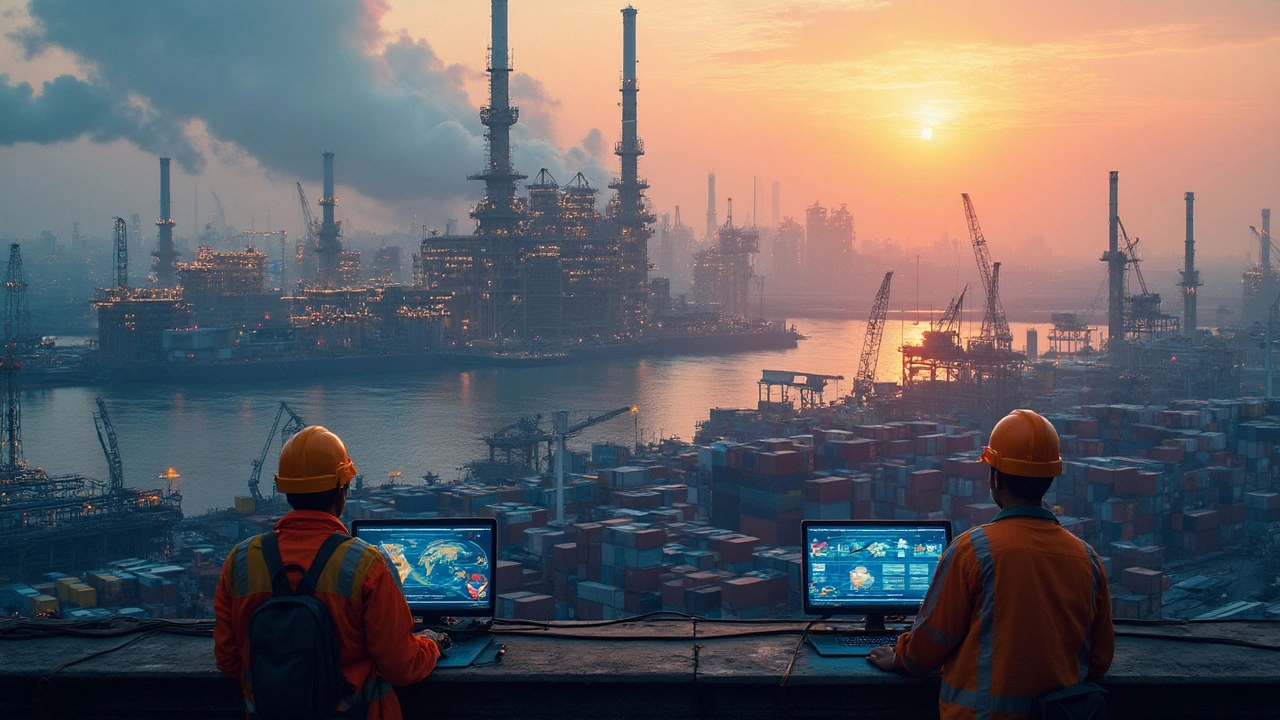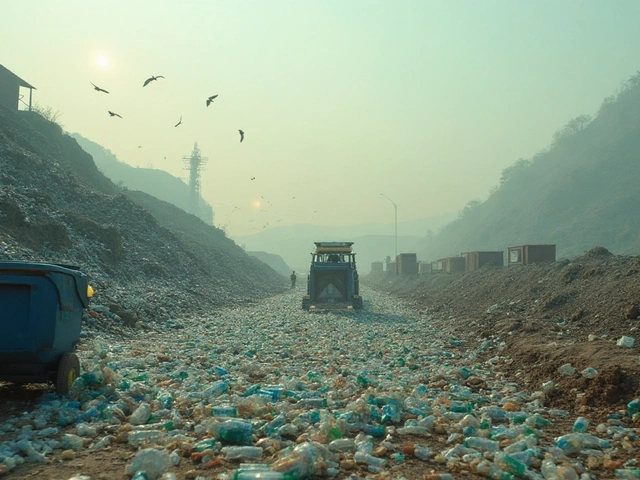Ever wondered which company actually tops the list as the world’s largest chemical manufacturer? It’s not some hidden brand you’ve never heard of. It’s BASF, based in Germany, that’s been the big fish for years, both in sales and influence. This might surprise anyone who expected a US or Asian giant to lead, especially with India’s fast rise in the chemical game.
BASF's reach isn’t just about giant factories churning out fertilizers and plastics. They shape what ends up on store shelves and which key ingredients go into products as varied as shampoos, paints, and even your car’s parts. So, every time you grab a plastic bottle or wash your hair, BASF’s hand is probably somewhere in the supply chain.
- Who Is the World's Largest Chemical Manufacturer?
- BASF: Leading the Pack and Why It Matters
- How Global Giants Influence India’s Chemical Market
- Tips for Indian Businesses Working with Industry Leaders
Who Is the World's Largest Chemical Manufacturer?
If you look at the global numbers, there’s one name that pops up everywhere: BASF. This German company has held the top spot for years, and not by a small margin. BASF doesn’t just lead in sales—they outpace competitors in size, product portfolio, and international presence. In 2024, BASF pulled in about 68.9 billion euros in sales. That’s more revenue than the annual GDP of some countries.
Just so you see how this shakes out, check these numbers from recent global rankings:
| Company | Country | 2024 Sales (Billion EUR) | Main Areas |
|---|---|---|---|
| BASF | Germany | 68.9 | Plastics, Chemicals, Agriculture |
| Sinopec | China | 66.2 | Petrochemicals, Fuels |
| Dow | USA | 43.9 | Materials, Packaging |
BASF runs more than 360 production sites worldwide. That means, whether you’re in Mumbai, Berlin, or Sao Paulo, you’re just a few hours’ drive from something BASF helped make. They supply chemicals for just about everything—farm fertilizers, pharmaceuticals, insulation, and even the coatings for your kid’s new bicycle.
People might think of chemical giants as hidden behind factory gates, but BASF’s products are everywhere. They’re the link between crude oil refineries and your favorite snacks, the shampoos in your bathroom, and even the paint that protects your house from rain. This massive scale is why so many Indian manufacturers—especially in plastics and agriculture—deal with BASF, either as direct partners or through supply chains.
If you want to spot a world leader, just look for the company that nearly every major industry relies on somewhere along the line. That’s BASF, and that’s why they still wear the crown as the world’s largest chemical manufacturer.
BASF: Leading the Pack and Why It Matters
No company in the chemical world pulls as much weight as BASF. They’ve been sitting at the top for a while—last year alone, their sales clocked in at over $75 billion. That’s not just a good year; that’s a solid lead in an industry that’s all about scale.
BASF isn’t just about volume—they cover more ground than you’d think. The company operates in more than 80 countries and has customers in just about every corner of the world. They produce chemicals you find in farming (like pesticides and fertilizers), plastics that end up in water bottles or cars, and even stuff used in food packaging and electronics. So, if you’re holding almost any manufactured product right now, there’s a decent chance BASF played a hand in it.
What’s wild is how much they invest in staying ahead. BASF pours over two billion dollars into research and development each year. This isn’t just for show—they’re pushing new, more efficient ways to make chemicals cleaner and cheaper, which means less pollution and smarter use of energy. These innovations keep them ahead of the next guy and open doors in markets like eco-friendly plastics and crop protection.
People often ask, "Why does it matter if BASF is number one?" Here’s the thing: when the leader makes a move, the rest of the industry usually follows. If BASF cuts down emissions or introduces a new material, everyone else scrambles to catch up. That kind of influence touches everything from raw material prices to the tech used in chemical plants—including right here in India, where largest chemical manufacturer strategies set the pace for both local giants and newcomers.

How Global Giants Influence India’s Chemical Market
When you think of the chemical industry in India, you can’t ignore the big foreign players. Companies like BASF, Dow, and SABIC have a huge impact here. BASF itself has been active in India for more than 130 years, operating over 9 production sites around the country. These firms help set standards, bring in new tech, and often drive smaller Indian companies to ramp up their game. If you see a cutting-edge chemical plant near Mumbai, there’s a good chance the blueprint came from one of these giants.
One clear effect is foreign direct investment. Major international companies have pumped billions into Indian manufacturing. In 2022, BASF India reported sales of ₹12,354 crore, employing more than 2,300 people in India alone. These global players often set up joint ventures or partner with homegrown brands, which means more jobs, better training, and skill upgrades for local workers. This trickles down to everything from safer plants to smarter supply chains.
Big players also shape what ends up in the Indian market. Want an eco-friendly detergent or a safer car? Large chemical manufacturers are often behind those innovations, introducing new products and helping Indian companies stick to international norms. At the same time, they drive up the competition, which pushes local brands like Reliance Industries and Tata Chemicals to invest more in research so they stay relevant.
- Tech transfer: Indian firms gain access to next-gen processes and materials.
- Export boost: Strong global partnerships help local companies tap into international markets.
- More choices: With global brands here, Indian buyers and manufacturers get more options, often at better prices and quality.
- Environmental impact: Big chemical producers carry stricter global standards that Indian sites must follow, which means safer products and cleaner plants.
| Company | Year Entered India | Major Operations | Estimated India Revenue (INR Crore) |
|---|---|---|---|
| BASF | 1890 | Agrochemicals, plastics, performance materials | 12,354 |
| Dow | 1957 | Polymers, coatings, silicones | 7,128 |
| SABIC | 1992 | Chemicals, fertilizers, agri-nutrients | 5,200 |
This mix of influences is why India’s chemical sector keeps modernizing. Global giants don’t just compete—they raise the bar for everyone. And when that happens, you see stronger local companies and better products for consumers.
Tips for Indian Businesses Working with Industry Leaders
If you’re in India and want to team up with the world’s largest chemical manufacturer, there are a few non-negotiables to get right. Everyone wants a piece of the global pie, but landing a partnership with giants like BASF or Reliance isn’t about just sending an email. These companies run tight ships, and they expect their partners to keep up—to global standards.
Start by focusing on quality control. BASF, for example, demands adhesion to international safety and environmental norms. It’s not just paperwork—they will want you to prove that you actually walk the talk. One way to show this? Get certified. Something like ISO 9001 for quality or ISO 14001 for environmental management goes a long way. These badges tell global firms you take things as seriously as they do.
Leverage technology. Most industry leaders now expect digital transparency. If you’ve got decent SAP or ERP systems in place, highlight that. It’s not about showing off; it’s just what they’re used to. Here’s a quick look at what BASF’s global supplier checklist often covers:
| Requirement | Why It Matters |
|---|---|
| ISO Certification | Proves reliability and consistency |
| Data-Driven Tracking (ERP/SAP) | Reduces risk of delays, errors |
| Full Safety Documentation | Keeps everyone compliant, prevents accidents |
| Traceability of Raw Materials | Essential in recalls or defects |
| Waiver of Corruption (legal clearances) | Meets international anti-bribery standards |
Relationships also matter—don’t underestimate the power of local connections and on-ground support. Large firms want to know that when things get stuck at a port or a supplier misses a shipment, you’ll have someone who can fix it. Indian businesses with good logistics partners and a network across states often find it easier to solve these real-world troubles.
- Stay updated with regulatory changes—especially around chemicals. India has new rules every few years, and having a proactive compliance officer is a big plus.
- Bulk-buy raw materials where you can. Larger orders can get you noticed, and sometimes unlock better deals with global suppliers.
- Ask for feedback after every major shipment or project—international partners like seeing local companies willing to learn and adapt.
Don’t forget: the largest chemical manufacturer has their pick of suppliers around the world. Getting in their club is all about proving you’re reliable, flexible, and willing to grow as fast as they do. That’s how some medium-sized companies in Gujarat or Maharashtra ended up being trusted suppliers for global heavyweights. The space is competitive, but if you can check these boxes, you’re already ahead of the crowd.







Write a comment